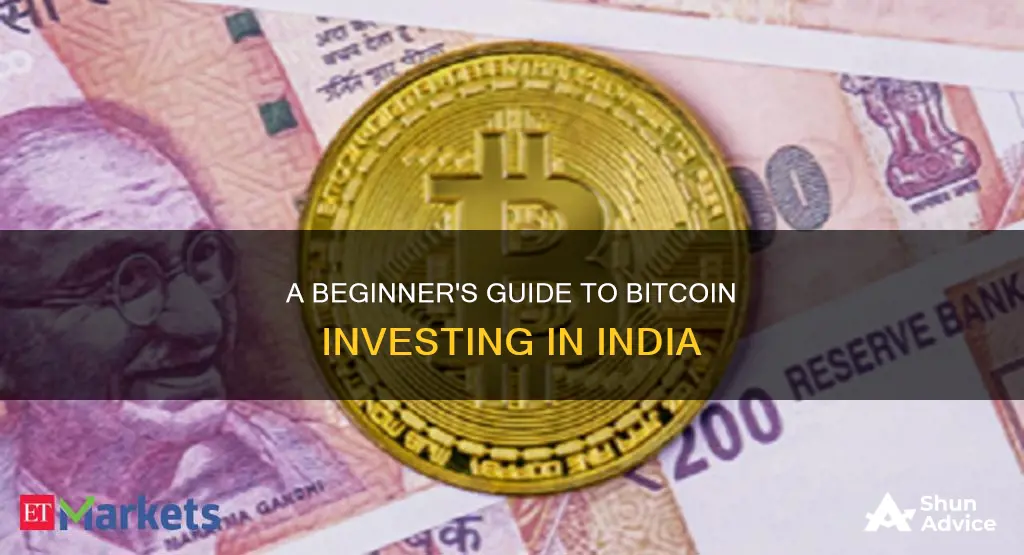
Bitcoin is one of the most sought-after cryptocurrencies in the world. However, India is still developing and catching up with the evolving industry. So, if you're in India and want to invest in Bitcoin, here are some things you should know.
First, you'll need to choose a cryptocurrency exchange platform that is registered with the Financial Intelligence Unit India. Some popular options include CoinDCX, CoinSwitch, Mudrex, and WazirX. These platforms offer user-friendly interfaces, extensive support for BTC trading pairs, and competitive trading fees.
Next, you'll need to create an account and complete the Know Your Client (KYC) process, which may include submitting essential documents such as your Aadhaar Card and PAN card.
Once your account is set up, you can connect a payment method, such as a bank account, debit or credit card, or a mobile payment service like Google Pay or Apple Pay. Keep in mind that different payment methods may incur varying transaction fees.
After funding your account, you can place your first order to buy Bitcoin. The amount you invest is flexible, as you can purchase a fraction of a Bitcoin.
Finally, consider how you want to store your Bitcoin. You can use the integrated wallet provided by the exchange or choose a third-party hot or cold wallet for added security.
Remember that investing in Bitcoin comes with risks due to its volatile nature, and it's not currently legalised by the RBI. So, be sure to do your research and only invest what you can afford to lose.
| Characteristics | Values |
|---|---|
| Minimum investment | Rs.100 or 100 INR |
| Payment methods | Bank transfers, NEFT, RTGS, debit or credit cards, net banking, Mobikwik, UPI, cryptocurrency wallet |
| Cryptocurrency exchanges | CoinDCX, CoinSwitch, Mudrex, WazirX, ZebPay, Unocoin, Binance, Crypto.com, Coinbase, Kraken, Gemini |
| Wallet types | Hot wallets, cold wallets |
What You'll Learn

Choose a crypto exchange
When choosing a crypto exchange, it is important to consider several factors, including security, user experience, supported cryptocurrencies, payment options, reputation, fees and charges, and customer support.
Security
Look for exchanges with robust security measures like two-factor authentication (2FA), cold storage, fund insurance, and data encryption.
User Interface and Experience
Choose an exchange with an intuitive and user-friendly interface, especially if you're a beginner. Ease of navigation and a clean design can enhance your trading experience.
Supported Cryptocurrencies
Check if the exchange supports a wide variety of cryptocurrencies, especially those you are interested in investing in.
Payment Options
Check the available payment options for depositing and withdrawing funds to ensure they meet your preferences.
Reputation
Read user reviews and engage with crypto enthusiasts on forums like Reddit and Discord to get a sense of the platform's reputation and user satisfaction.
Fees and Charges
Understand the fee structure of the exchange/app, including trading fees, deposit and withdrawal fees, and any other charges. Lower fees can save you a considerable amount of money over time.
Customer Support
Look for platforms with responsive and helpful customer support, ready to assist you when you encounter issues. Ideally, the platform should have 24/7 phone, email, and live chat support.
- CoinDCX: Recognised as one of the safest and most transparent crypto exchanges in India, with more than 1.5 crore registered users. It offers access to up to 500+ cryptocurrencies and is known for its significant liquidity.
- CoinSwitch: One of the top crypto platforms in India, with over 2 crore registered users. CoinSwitch offers trading options in nearly 100 cryptocurrencies and is highly recommended for beginners. It allows investments to start from as low as INR 100 in Bitcoin.
- Mudrex: A user-friendly platform with over 2 million users, offering investment opportunities in over 350 cryptocurrencies. It is registered with the Financial Intelligence Unit (FIU) and offers great security features.
- WazirX: One of India's most reliable and rapidly growing platforms for crypto trading, with over 15 million users. WazirX offers access to over 300 cryptocurrencies and a high-liquidity, auto-matching peer-to-peer (P2P) platform.
- ZebPay: One of the largest platforms for crypto trading in India, with over 3 million users. ZebPay offers a user-friendly trading environment, lightning network payments, and zero deposit fees.
- BitBNS: Became the largest crypto exchange in India in mid-2022, with a whopping 82% market share. It offers features like margin, futures, and options trading, and a referral program.
Bitcoin's Volatile Nature: Why You Should Still Invest
You may want to see also

Decide on a payment option
After choosing a crypto exchange, you must fund your account before you can begin investing in Bitcoin. Depending on the exchange, you can fund your account through bank transfers, net banking, Mobikwik, a cryptocurrency wallet, or UPI.
Remember that platforms may charge higher transaction fees for specific funding options. For example, CoinDCX doesn't charge a fee if you use UPI and bank transfers, but it charges 0.5% on net banking. On the other hand, the trading fee on WazirX depends on your trading volume in INR pairs over the last 30 days and your current WRX holdings. WazirX also requires you to top up your Mobikwik wallet using UPI or bank transfer before transferring the funds. Credit cards are not supported for wallet transfer, and charges depend on the getaway you use.
Because fees reduce the amount of money you can invest (and therefore also the amount of money you have to grow and compound), electronic transfers from a bank account tend to make more sense than other methods.
Once your account is funded, you can place your first order to buy Bitcoin. Depending on the platform you're using, you may be able to purchase it by tapping a button, or you may have to enter Bitcoin's ticker symbol (BTC). You'll then have to input the amount you want to invest.
When the transaction is complete, you will own a portion of Bitcoin. That's because buying a single Bitcoin now requires a large upfront investment. If Bitcoin's current price was $38,000, for example, you'd need to invest that much. If you invested less, say $1,000, you'd get a percentage, in this case, 0.026%, of a Bitcoin.
Free Ways to Earn Bitcoin: No Investment Needed
You may want to see also

Place an order
Once you have chosen a crypto exchange and decided on a payment option, you can place your first order to buy Bitcoin. Depending on the platform you’re using, you may be able to purchase it by tapping a button, or you may have to enter Bitcoin’s ticker symbol (BTC). You’ll then have to input the amount you want to invest.
On the Binance platform, for example, you can navigate to the "Buy Crypto" link at the top of the website navigation to see the available options to buy Bitcoin in your country. You can then select your preferred payment method, such as debit/credit card, Google Pay, Apple Pay, or third-party payment. After verifying the details and confirming the order, you will be redirected to your bank's transaction page to verify the payment. Once verified, the coin will appear in your Spot Wallet.
In India, you can buy Bitcoin with a minimum capital of Rs.100 or INR 100. This limit could vary between different crypto exchanges.
IRA Bitcoin Investment: What You Need to Know
You may want to see also

Complete the KYC process
To start investing in Bitcoin in India, you must complete the KYC (Know Your Customer) process. This is a mandatory requirement for all crypto exchanges in India. The KYC process involves verifying your documents, such as your PAN card, Aadhaar card, and address proof. Here is a step-by-step guide to completing the KYC process on a crypto exchange:
Step 1: Select a Crypto Exchange
Choose a crypto exchange that offers good security at optimal prices. Popular crypto exchanges in India include CoinSwitch, WazirX, and UnoCoin. These platforms offer user-friendly interfaces, multiple payment options, and low fees.
Step 2: Register and Open an Account
Once you have selected a crypto exchange, register and open an account by providing your email address and creating a password. You will then need to verify your email address by locating and clicking a link sent to your mailbox.
Step 3: Complete the KYC Process
After registering, initiate the KYC process by selecting your country and providing your name, date of birth, and identity proof, such as a copy of your PAN card. Some exchanges may also require address proof. Make sure to read and agree to the terms and conditions of the exchange.
Step 4: Wait for Confirmation
After submitting your documents, the crypto exchange will review and verify your information. Once your account is approved, you will receive a confirmation, and your crypto account will be ready for transactions.
Step 5: Link Your Bank Account
To buy and sell Bitcoin, you will need to link your bank account to your crypto exchange account. This will allow you to deposit and withdraw funds for your Bitcoin transactions.
By following these steps and completing the KYC process, you can start investing in Bitcoin in India through a crypto exchange. Remember to do your research, understand the risks involved, and only invest what you can afford to lose.
Bitcoin Investment: Is It Still Worth It?
You may want to see also

Store your Bitcoin in a wallet
Storing your Bitcoin in a wallet is a crucial step in the process of investing in cryptocurrency. It is important to select a wallet that suits your needs and offers robust security features to protect your funds. Here is a detailed guide to help you understand the process and make informed decisions:
Understanding Bitcoin Wallets
Bitcoin wallets are digital or hardware tools that store your private keys, allowing you to securely send, receive, and manage your Bitcoin. It's important to note that Bitcoins are not stored in these wallets; instead, they are recorded on a public ledger called the blockchain. The wallet ensures that your Bitcoins are safe and can only be accessed by you using your private key.
Types of Bitcoin Wallets
There are two main categories of Bitcoin wallets:
- Hot Wallets (Software Wallets): These wallets are connected to the internet and can be accessed through web browsers, desktop computers, or mobile devices. They are convenient for frequent transactions and are typically free to use. However, they are more susceptible to cyberattacks, viruses, and malware due to their online nature. Examples include web wallets like Coinbase and MetaChain, desktop wallets like Exodus and Bitcoin Core, and mobile wallets like Mycelium and the Bitcoin Wallet.
- Cold Wallets (Hardware Wallets): Cold wallets are offline storage solutions, making them highly secure as they cannot be accessed by hackers. They come in the form of physical devices, such as USB drives, and store your private keys offline. Cold wallets are ideal for storing large amounts of Bitcoin and typically offer features like pin protection and multi-signature technology. Examples include Ledger Nano S/S Plus and Trezor Model T.
Choosing a Bitcoin Wallet
When selecting a Bitcoin wallet, consider the following:
- Security: Opt for a wallet with robust security features like two-factor authentication, regular security audits, strong password protection, and backup options.
- Access to Private Keys: Choose a wallet that gives you full access to your private keys, ensuring that you have control over your Bitcoin.
- Backup Features: Look for wallets that offer cloud backup for your private keys, making it easier to restore access in case of device loss or malfunction.
- Multi-Signature Wallets: Multi-sig wallets require multiple approvals for transactions, adding an extra layer of protection.
- Fee Customization: Select a wallet that allows you to customize the fees you pay for Bitcoin transactions.
Setting Up Your Bitcoin Wallet
To set up your Bitcoin wallet, follow these steps:
- Download a digital wallet application from your app store.
- Sign up and create an account with a strong password.
- Create your private key and store it safely. Do not share it with anyone.
- Transfer your Bitcoin to the wallet.
- Use the receiving address to receive BTC from others.
Tips for Protecting Your Bitcoin Wallet
- Do not store your password or private key in digital form, and avoid sending it to anyone.
- Create a manual backup by writing down your private key and storing it in a safe place.
- Enable two-factor authentication and other security protocols for added protection.
- For large crypto holdings, consider using a cold storage wallet for enhanced security.
- Stay vigilant and cautious while making crypto transactions.
Bitcoin Halving: Pre- or Post-Event Investment Strategy?
You may want to see also
Frequently asked questions
You can buy Bitcoin on a cryptocurrency exchange platform. Some of the most popular exchanges in India include CoinDCX, CoinSwitch, Mudrex, and WazirX. You will need to provide personal identification documents and a payment method.
There is no minimum amount of Bitcoin you need to buy. You can purchase small units of Bitcoin, starting from as low as 100 INR or $1.
You can store your Bitcoin in a hot wallet or a cold wallet. A hot wallet is connected to the internet and allows you to access your Bitcoin more easily. A cold wallet is offline and provides greater security.
Yes, it is legal to buy Bitcoin in India. However, the RBI has not made it legal, so there is a risk of losing your capital.







